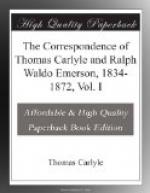A Bronson Alcott, who is a great man if he cannot write well, has come to Concord with his wife and three children and taken a cottage and an acre of ground to get his living by the help of God and his own spade. I see that some of the Education people in England have a school called “Alcott House” after my friend. At home here he is despised and rejected of men as much as was ever Pestalozzi. But the creature thinks and talks, and I am glad and proud of my neighbor. He is interested more than need is in the Editor Heraud. So do not fail to tell me of him. Of Landor I would gladly know your knowledge. And now I think I will release your eyes.
Yours always,
R.W.
Emerson
LIV. Emerson to Carlyle
Concord, 30 June, 1840
My Dear Carlyle,—Since I wrote a couple of letters to you,—I know not exactly when, but in near succession many weeks ago,— there has come to me Wilhelm Meister in three volumes, goodly to see, good to read,—indeed quite irresistible;—for though I thought I knew it all, I began at the beginning and read to the end of the Apprenticeship, and no doubt shall despatch the Travels, on the earliest holiday. My conclusions and inferences therefrom I will spare you now, since I appended them to a piece I had been copying fairly for Margaret Fuller’s Dial,—“Thoughts on Modern Literature,” and which is the substance of a lecture in my last winter’s course. But I learn that my paper is crowded out of the first Number, and is not to appear until October. I will not reckon the accidents that threaten the ghost of an article through three months of pre-existence! Meantime, I rest your glad debtor for the good book. With it came Sterling’s Poems, which, in the interim, I have acknowledged in a letter to him. Sumner has since brought me a gay letter from yourself, concerning, in part, Landor and Heraud; in which as I know justice is not done to the one I suppose it is not done to the other. But Heraud I give up freely to your tender mercies: I have no wish to save him. Landor can be shorn of all that is false and foolish, and yet leave a great deal for me to admire. Many years ago I have read a hundred fine memorable things in the Imaginary Conversations, though I know well the faults of that book, and the Pericles and Aspasia within two years has given me delight. I was introduced to the man Landor when I was in Florence, and he was very kind to me in answering a multitude of questions. His speech, I remember, was below his writing. I love the rich variety of his mind, his proud taste, his penetrating glances, and the poetic loftiness of his sentiment, which rises now and then to the meridian, though with the flight, I own, rather of a rocket than an orb, and terminated sometimes by a sudden tumble. I suspect you of very short and dashing reading in his books; and yet I should think you would like him,—both of you such glorious haters of cant. Forgive me, I have put you two together twenty times in my thought as the only writers who have the old briskness and vivacity. But you must leave me to my bad taste and my perverse and whimsical combinations.




